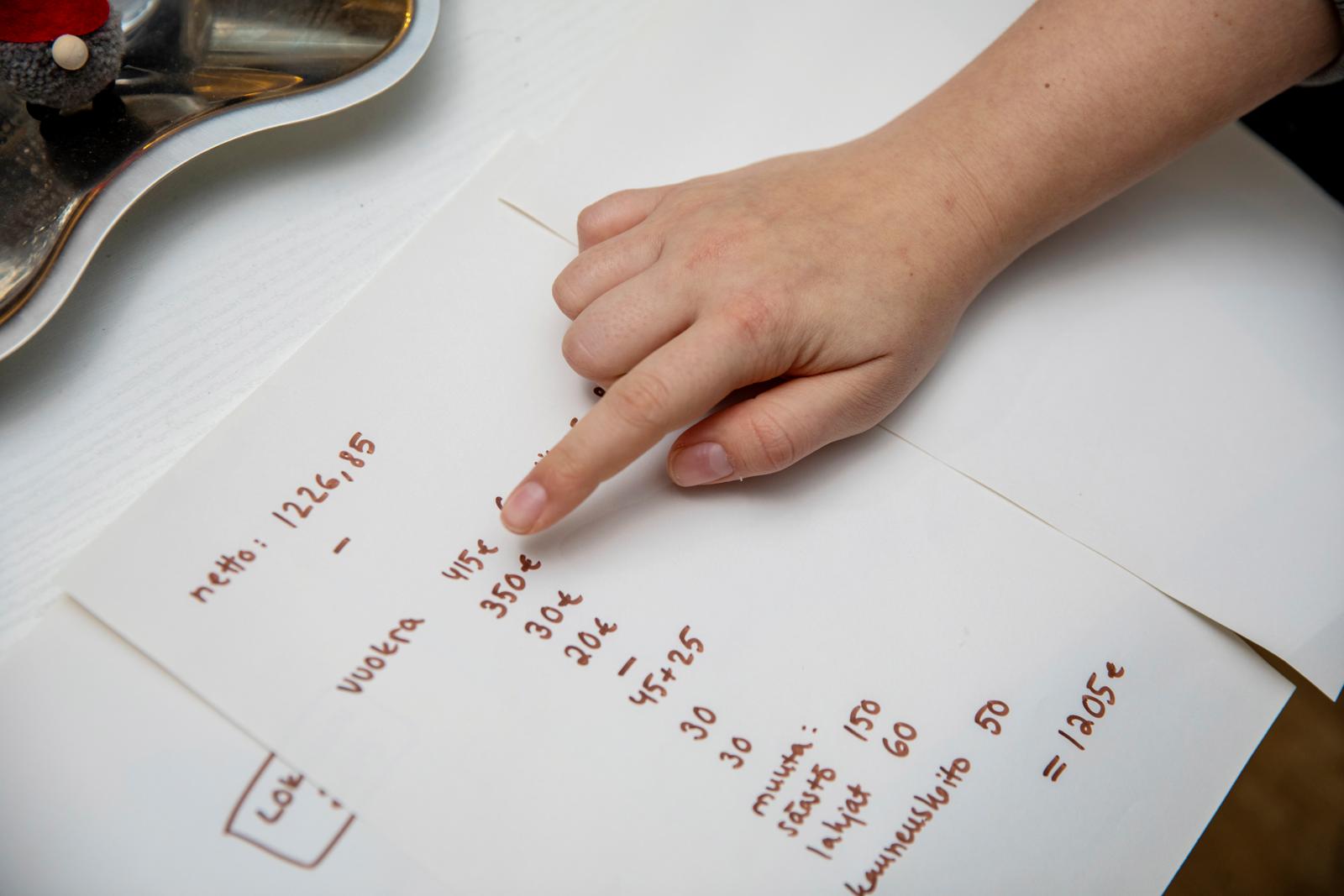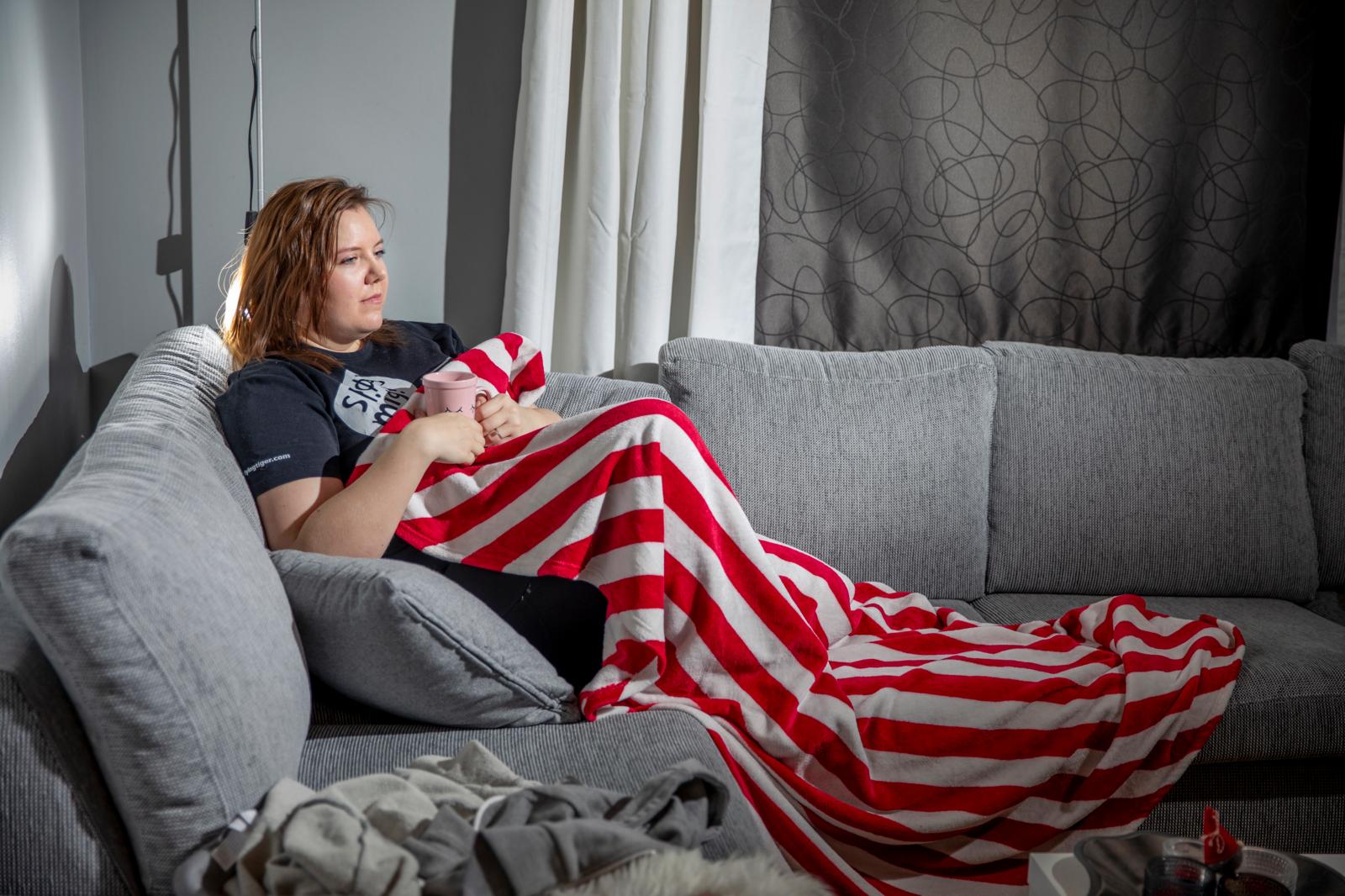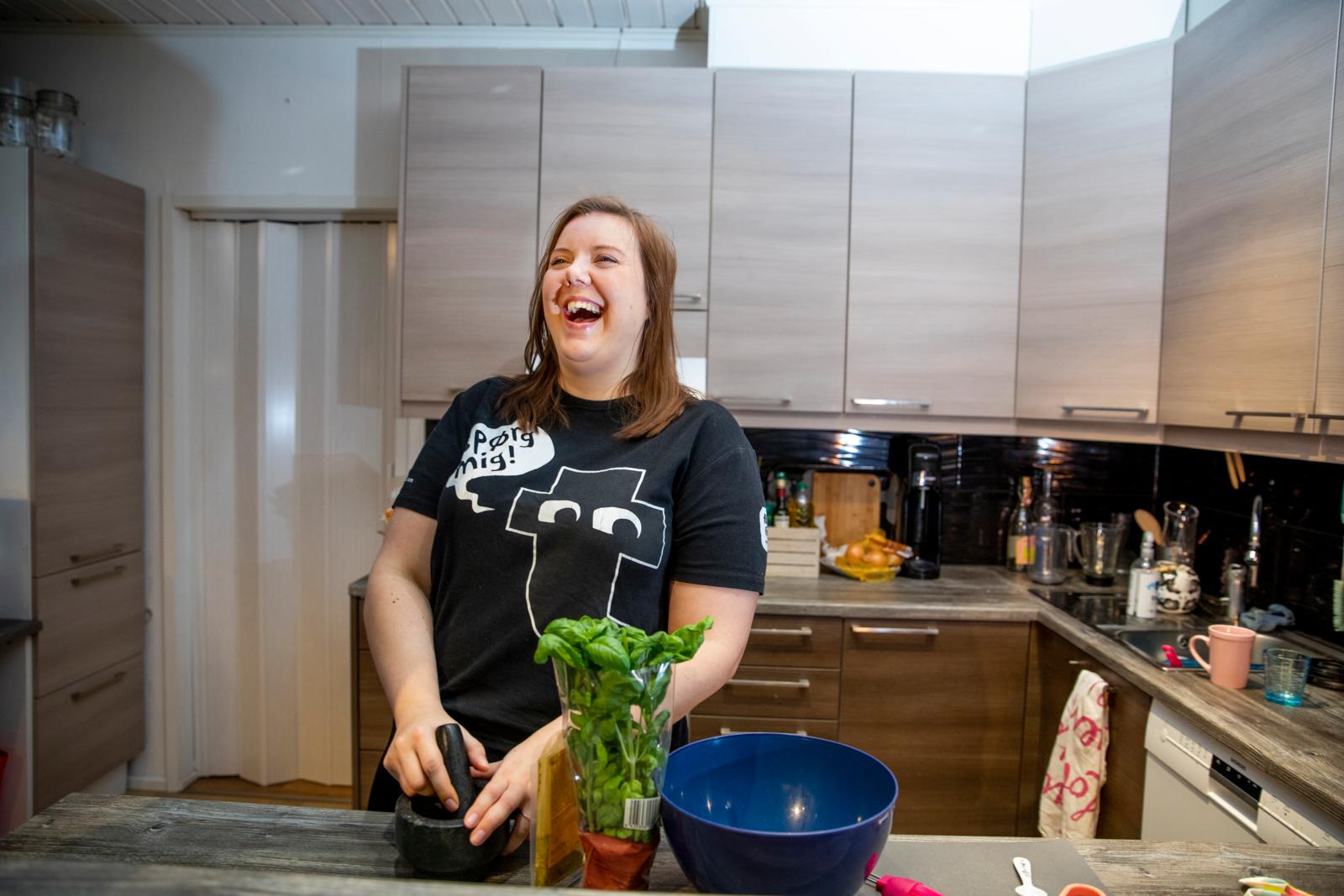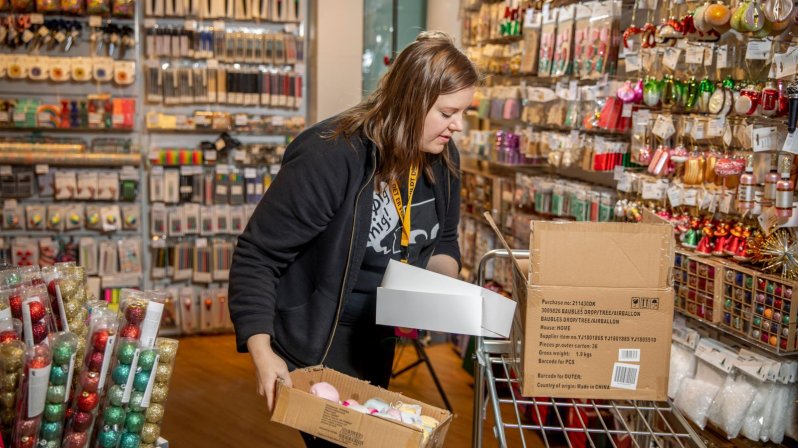Extra hours bring some leeway to the finances of part-time workers
Sales assistant Iina Raita enjoys her work, but has also experienced wage poverty. Part-time workers have to save up the euros earned from their extra hours if they are to make ends meet.
IINA RAITA
Age: 31
Lives: Kouvola
Home: rented apartment, 92 m2
Occupation: Sales assistant
Pay: 1620 euros before tax
Family: Husband
Hobbies: cinema, cooking, yoga, jogging and “hygge”
“Come on in!” Iina Raita calls out as she opens the door of her 1930s apartment building in Kouvola.
Her infectious laugh and cheerful manner make you feel welcome the moment you reach the door. Inside, her cosy home is decorated in harmonious grey, brown and pale shades. We sit discussing money matters at the coffee table. Unlike many others perhaps, it is easy for Raita to talk about it.
“My colleagues and I often ask each other how much we got paid”, she says.
Raita began her career at the age of 14 with a summer job at her grandmother’s bookkeeping firm in Tampere, where she did copying jobs. In the coming summers she added to her hours and pay. After high school she studied artisanal dressmaking, since she had a flair for designing clothes and drawing models.
“I have liked designing clothes since I was young. I also always put a price tag on them; that shows I had a head for figures even then”, Raita laughs.
Having completed her dressmaking studies, Raita found there were no jobs on offer in Kouvola matching her studies. She got by on her savings from her summer jobs.
She was searching for work, but only casual employment was available. She did all sorts of things: through a temping agency she marketed newspaper supplements, advised train travellers how to use new station vending machines and sold subscriptions by telephone. Her income depended on the type of work that happened to come along. During the holidays she continued to do bookkeeping work in her grandmother’s firm.

As a temporary worker she didn’t get any financial support from society because the income of her spouse at the time was counted in.
“Back then we really wondered whether it would make more sense to live together apart. But we concluded that we wouldn’t go to those lengths just to get some subsidies”, Raita says.
At that time her living expenses were low and things were going well from day to day. She just needed a job. Raita sat at the living room table each morning drinking tea and browsing vacancies on the mol.fi website. She sent in one or more applications each week, but with no previous experience in the retail sector there were no career openings in clothes shops either. She even applied to a laundry, thinking it was slightly related to her own area of expertise.
“At interview I was asked if I made my bed in the morning. That took me by surprise! I don’t know if it was down to that, but I didn’t get the job”, she chuckles.
After two years of job hunting she finally landed a position.
In autumn 2012 Kouvola’s Veturi shopping centre opened, the 10th largest mall in Finland. Many new job vacancies appeared on the mol.fi website. One of these caught Raita’s attention: the Danish design chain Flying Tiger was looking for sales staff for part-time positions. Inspired by the playful appearance of the company’s website and the wide range of products, she felt this was the job for her.
“There are single-hole hole punchers and fun design products, this is the place for me!” she thought as she studied the company’s website.
Soon she signed a permanent employment contract for part-time work that guaranteed at least ten hours a week. But with a new shop to set up, total hours were much higher for some time.

A year later, however, with the shop up and running, Raita’s fortunes took a turn for the worse. She split up with her partner and moved into a rented flat of her own. Living on her own meant she could no longer share her living costs, travel costs or food purchases. In months when her working hours didn’t exceed the ten hours a week promised in the employment contract, her monthly pay cheque was around 700 euros. With her rent taking up 550 euros, there wasn’t much money left over for anything else.
“I had to be very careful with money in those days!” Raita recalls.
Clothes, beauty treatments, hairdressing and hobbies were the first items to go. She also took care to note down all her income and expenditure. Having two accounts in the same bank helped her to keep her finances in order.
“The reason I have two accounts is that if I get more hours I put some of my pay to one side for those months when I have fewer hours. Then I can transfer myself the amount of money I need to get by”, she says.
After a year living alone Raita met her present husband and she got more weekly hours in her employment contract. First 19 hours and 18 months ago 24 hours.
”Now it’s all right. I know that I’m not going be in a situation where I’m earning just 600-700 euros a month.”
She still has some way to go before she’s on full working hours. The trend throughout the retail sector is for more part-time work, which has increased steadily over the last twenty years. According to Statistics Finland, there were 39,000 part-time workers in the retail sector in Finland in 1989, and this year there were 58,300. At the same time, in this decade the number of workers on 31–40 hours a week has dropped, whilst the number on 21–30 hours has increased.
Evening and weekend supplements have become a more important component of part-time workers’ monthly earnings.
“You notice it straight away in your pay packet if you work evenings and weekends. Sundays are nice days to be at work – the shifts are short and well-paid,” Raita says.
Her shop currently has three permanent employees. Two other agency workers come from a temping agency.
“The work should be organised so that everybody gets enough good shifts, that is evenings and Sundays. And nobody should have to be on their own for very long. It makes it difficult to go to the toilet, for example, if you’re on your own in the shop for many hours”, Raita says.
“When the shop started up we always worked in pairs. But now on every shift you find yourself working alone. The company is running on a tighter budget, and year by year we have to produce better results”.
She hopes that the upcoming collective bargaining round will look at monitoring working alone.
Nowadays Raita saves at least 10 per cent of her wages, and more if she can. She has already thought about how to invest those savings in future: a down payment on a house. She regularly keeps track of money coming in and going out every day using her online bank.
Having learned from her twin-account strategy when times were tough, she knows she won’t be caught out even in those months when she doesn’t have many Sunday shifts and she only has the minimum hours in her contract.
Christmas shopping and the January sales attract lots of customers to shopping centres, so at Christmas she has plenty of extra hours. This also means more euros going into her savings account for the house of her dreams.

At Christmas Raita will also have time to relax and enjoy some festive treats.
“I have normally been at work on Christmas Eve, but this year I’m off duty. I’m planning to cook turkey and traditional vegetable dishes at least. It’s so nice to cook at home!”
INCOME (TOTAL 1620 euros)
gross pay: 1620 euros
net pay: 1227 euros
EXPENDITURE (TOTAL 1205 euros)
rent 415€ (half of 830€)
food + non-food items 350€
clothes 30€
health 20€
travel costs 45 + 25€
phone and internet, 30 €
electricity 30 €
beauty treatments 50€
savings 150€
gifts 60€
*Table shows income and expenditure for October 2019.
Based on respondents to the PAM members’ survey in spring 2019, the net monthly earnings of part-time sales assistants were 1391 euros and for full-time staff 1705 euros.



